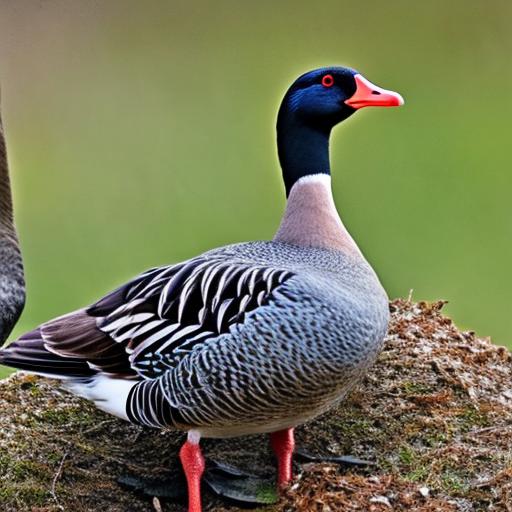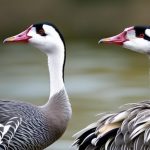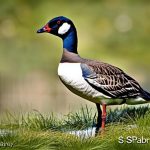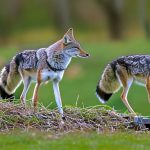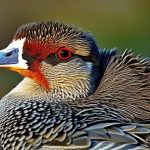Geese can be a common nuisance for property owners, especially those who live near bodies of water or open fields. These large birds are attracted to areas that provide them with food, water, and shelter, which often includes residential and commercial properties. While geese may seem harmless, they can cause a range of problems for property owners. It is important to address the issue of geese on property in order to protect the property and maintain a safe and healthy environment.
Key Takeaways
- Geese can cause significant damage to property and pose health risks to humans.
- Understanding geese behavior can help in developing effective control strategies.
- Geese can damage lawns, gardens, and buildings, and their droppings can be a health hazard.
- Legal considerations must be taken into account when controlling geese, as they are protected by federal and state laws.
- Physical barriers, repellents, deterrents, sound and visual devices, and habitat modification can all be effective in keeping geese away.
Understanding the behavior of geese
Geese are social animals that live in flocks and are known for their honking calls and distinctive V-shaped flight patterns. They are attracted to areas that provide them with easy access to food, such as grassy lawns and open fields. Geese are also drawn to bodies of water, as they use these areas for drinking, bathing, and nesting. When geese find a suitable location, they will often return year after year.
The behavior of geese can have a significant impact on property owners. Geese are known for their droppings, which can cover sidewalks, driveways, and other outdoor areas. Not only is this unsightly, but it can also create a slipping hazard. In addition, geese can cause damage to lawns and landscaping by grazing on grass and pulling up plants. Their nesting habits can also be problematic, as they may choose to nest in inconvenient or unsafe locations.
The negative impacts of geese on property
Geese can have several negative impacts on property owners. One of the most obvious is the damage they can cause to property. Their droppings can be difficult to clean up and can stain surfaces such as concrete or wood. In addition, their constant grazing can damage lawns and landscaping, leading to costly repairs or replacements.
Another concern is the health risks associated with geese. Their droppings can contain bacteria and parasites that can be harmful to humans and pets. In addition, geese can become aggressive, especially during nesting season, and may attack people or pets that come too close to their nests.
The presence of geese can also have an impact on property values. Potential buyers may be deterred by the sight and smell of geese, and the damage they cause to property can decrease its overall appeal.
Legal considerations for geese control
When it comes to controlling geese on property, there are legal considerations that property owners must be aware of. In many areas, geese are protected under federal or state laws, which means that certain methods of control may be restricted or require permits. It is important to familiarize yourself with the regulations in your area before taking any action.
Some common legal considerations for geese control include obtaining permits for egg addling or nest removal, following guidelines for humane trapping and relocation, and adhering to restrictions on the use of certain deterrents or repellents. Failure to comply with these regulations can result in fines or other legal consequences.
It is important to follow these regulations not only to avoid legal trouble but also to ensure that geese are treated humanely. There are many effective and humane methods of geese control available, so it is important to explore these options before resorting to more drastic measures.
Physical barriers to keep geese away
One effective method of geese control is the use of physical barriers. These barriers can be used to prevent geese from accessing certain areas of a property, such as lawns or ponds. Some common physical barriers include fences, netting, and hedges.
Fences can be an effective way to keep geese out of specific areas. They should be at least three feet high and have small openings to prevent geese from squeezing through. Netting can also be used to cover ponds or other bodies of water to prevent geese from landing or swimming in them. Hedges can be planted to create a natural barrier that geese are less likely to cross.
While physical barriers can be effective, they may not be suitable for all properties. They can be expensive to install and maintain, and they may not be aesthetically pleasing. In addition, geese may find ways to bypass or overcome these barriers, so it is important to regularly inspect and maintain them.
Repellents and deterrents for geese
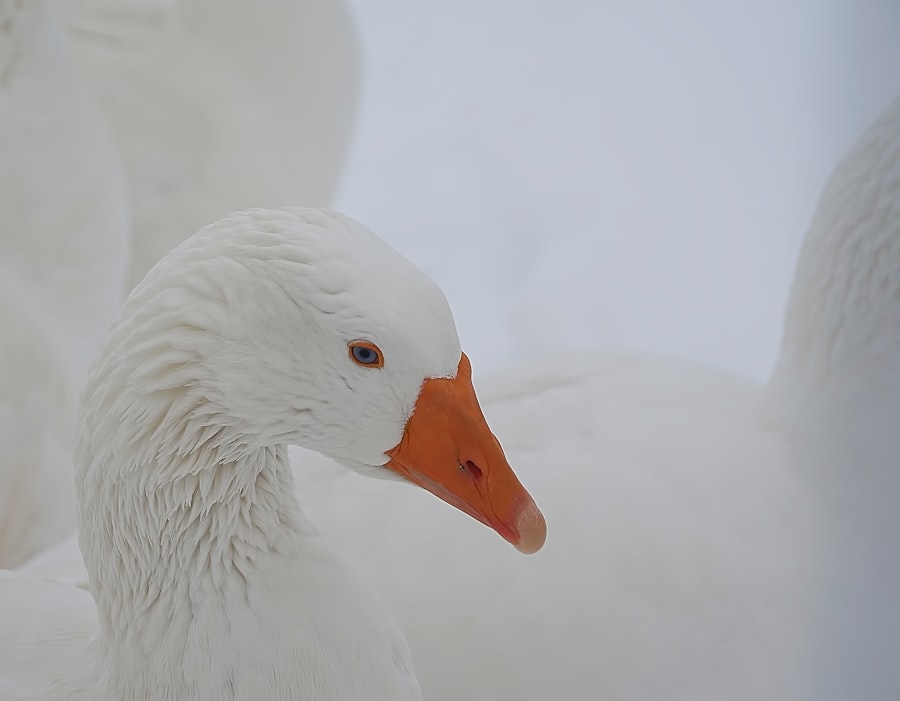
Another method of geese control is the use of repellents and deterrents. These products are designed to make an area unattractive or uncomfortable for geese, encouraging them to move on to a different location.
There are several types of repellents and deterrents available, including sprays, decoys, and visual deterrents. Sprays can be applied to grass or other surfaces to make them taste unpleasant to geese. Decoys, such as fake predators or swans, can be placed in an area to scare off geese. Visual deterrents, such as reflective tape or scare balloons, can also be effective at deterring geese.
It is important to note that while these methods can be effective, they may not provide long-term solutions. Geese can become accustomed to certain deterrents over time, so it may be necessary to rotate or combine different methods for maximum effectiveness.
Sound and visual devices to scare off geese
In addition to repellents and deterrents, sound and visual devices can also be used to scare off geese. These devices are designed to startle or intimidate geese, encouraging them to leave the area.
Some common sound devices include sirens, horns, and ultrasonic devices. These devices emit loud noises that can startle geese and make them uncomfortable. Visual devices include lasers, strobe lights, and scarecrows. These devices create movement or unusual visual stimuli that can scare off geese.
While sound and visual devices can be effective, they may not be suitable for all properties. They can be loud or visually disruptive, which may not be desirable in residential or commercial areas. In addition, geese can become habituated to certain sounds or visuals over time, so it is important to regularly change or move these devices to maintain their effectiveness.
Habitat modification to discourage geese from nesting
Another method of geese control is habitat modification. By altering the environment to make it less attractive to geese, property owners can discourage them from nesting or staying in the area.
There are several ways that habitat modification can be used to discourage geese from nesting. One common method is to remove or reduce food sources, such as grass or aquatic plants. Geese are attracted to areas with abundant food, so by limiting their access to these resources, property owners can make the area less appealing.
Altering the landscape can also be effective at discouraging geese from nesting. For example, installing rocks or gravel around ponds or other bodies of water can make it difficult for geese to access the area. Planting tall grasses or shrubs near water can also create a barrier that geese are less likely to cross.
It is important to note that habitat modification may take time and ongoing maintenance to be effective. Geese are adaptable creatures and may find new food sources or nesting sites if their preferred options are removed. Regular monitoring and maintenance of the property is necessary to ensure long-term success.
Professional geese control services
For property owners who are unable or unwilling to address the issue of geese on their own, professional geese control services can provide a solution. These services specialize in the humane removal and prevention of geese from properties.
Professional geese control services offer a range of services, including nest removal, egg addling, and habitat management. They have the knowledge and experience to effectively and safely address the issue of geese on a property. In addition, they can provide ongoing maintenance and monitoring to ensure that geese do not return.
Hiring a professional geese control service can provide peace of mind for property owners. They can take care of the problem quickly and efficiently, allowing property owners to focus on other aspects of property management.
Long-term strategies for preventing geese from returning
While there are many effective methods of geese control available, it is important to also consider long-term strategies for preventing geese from returning to a property. By addressing the underlying factors that attract geese, property owners can reduce the likelihood of future infestations.
One long-term strategy is habitat management. This involves creating an environment that is less attractive to geese by removing or reducing food sources and altering the landscape. Regular maintenance and monitoring of the property is necessary to ensure that these changes are effective.
Education is another important long-term strategy. By educating property owners and the community about the negative impacts of geese and the importance of prevention, it is possible to create a culture of responsible geese control. This can include providing information about legal considerations, effective methods of control, and the benefits of hiring professional services.
Geese can be a significant problem for property owners, causing damage to property and posing health risks. It is important to address the issue of geese on property in order to protect the property and maintain a safe and healthy environment. There are many effective methods of geese control available, including physical barriers, repellents and deterrents, sound and visual devices, habitat modification, and professional geese control services. By implementing these methods and considering long-term strategies for prevention, property owners can effectively address the problem of geese on their property. It is important for property owners to take action and explore these options to ensure the safety and well-being of their property.
If you’re looking for effective ways to keep geese off your property, you may also be interested in learning how to convert a shed into a chicken coop. This related article from Poultry Wizard provides valuable insights and step-by-step instructions on transforming a shed into a safe and comfortable home for your chickens. By implementing the tips and techniques outlined in this article, you can create a secure space for your feathered friends while keeping unwanted geese at bay. Additionally, Poultry Wizard offers other helpful resources such as guides on turning a shed into a chicken coop and chicken coop run plans to further enhance your poultry-keeping experience.
FAQs
What are some effective ways to keep geese off my property?
There are several effective ways to keep geese off your property, including using decoys, installing fencing or netting, using repellents, and modifying the landscape.
What are some natural repellents that can be used to keep geese away?
Some natural repellents that can be used to keep geese away include planting certain types of vegetation, using noise deterrents, and using visual deterrents such as reflective tape or balloons.
Is it legal to harm or kill geese to keep them off my property?
No, it is not legal to harm or kill geese to keep them off your property. Geese are protected under federal law, and harming or killing them can result in fines and other legal consequences.
What are some potential health risks associated with having geese on my property?
Geese can carry diseases such as avian influenza and salmonella, which can be transmitted to humans through contact with their feces or other bodily fluids. Additionally, their droppings can create unsanitary conditions and attract other pests.
What should I do if I encounter an injured or sick goose on my property?
If you encounter an injured or sick goose on your property, it is best to contact a local wildlife rehabilitation center or animal control agency for assistance. Attempting to handle or care for the goose yourself can be dangerous and may further harm the animal.
Meet Walter, the feathered-friend fanatic of Florida! Nestled in the sunshine state, Walter struts through life with his feathered companions, clucking his way to happiness. With a coop that’s fancier than a five-star hotel, he’s the Don Juan of the chicken world. When he’s not teaching his hens to do the cha-cha, you’ll find him in a heated debate with his prized rooster, Sir Clucks-a-Lot. Walter’s poultry passion is no yolk; he’s the sunny-side-up guy you never knew you needed in your flock of friends!

